有关焦虑的高中英语作文
- 格式:docx
- 大小:21.51 KB
- 文档页数:4
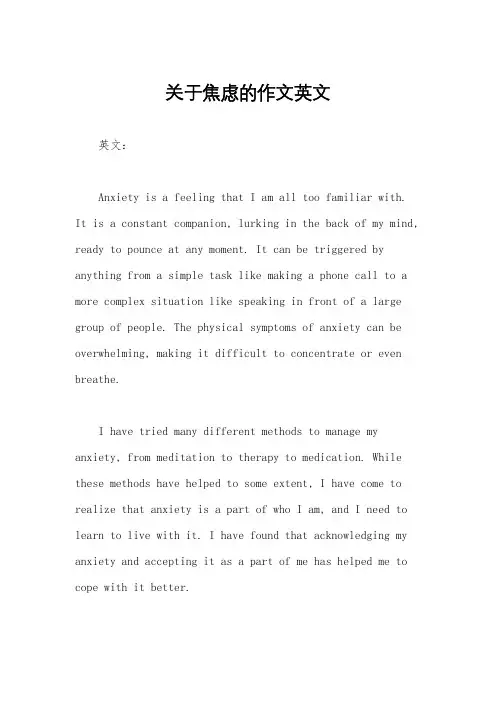
关于焦虑的作文英文英文:Anxiety is a feeling that I am all too familiar with. It is a constant companion, lurking in the back of my mind, ready to pounce at any moment. It can be triggered by anything from a simple task like making a phone call to a more complex situation like speaking in front of a large group of people. The physical symptoms of anxiety can be overwhelming, making it difficult to concentrate or even breathe.I have tried many different methods to manage my anxiety, from meditation to therapy to medication. While these methods have helped to some extent, I have come to realize that anxiety is a part of who I am, and I need to learn to live with it. I have found that acknowledging my anxiety and accepting it as a part of me has helped me to cope with it better.One of the most challenging aspects of anxiety is the way it can impact my relationships with others. It can make me feel isolated and alone, as if no one else understands what I am going through. However, I have found that being open and honest with my loved ones about my anxiety has helped to strengthen our relationships. They may not fully understand what I am going through, but they are willing to listen and support me.In the end, I have come to accept that anxiety is a part of my life, but it does not define me. I am still able to pursue my goals and dreams, even if I have to do it while dealing with anxiety. It is a constant battle, but one that I am willing to fight.中文:焦虑是一种我非常熟悉的感觉。
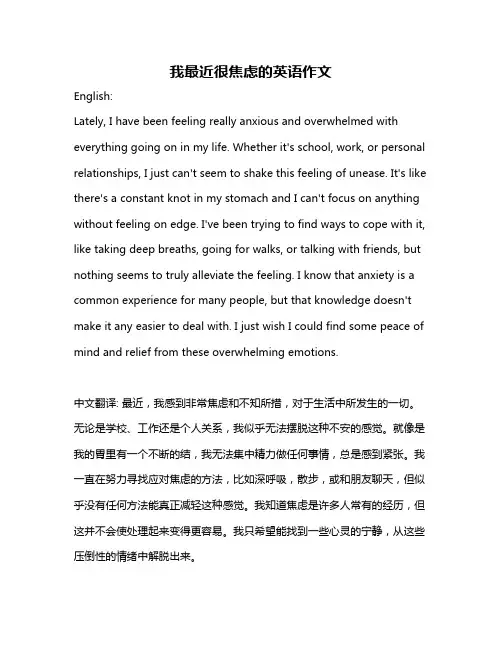
我最近很焦虑的英语作文English:Lately, I have been feeling really anxious and overwhelmed with everything going on in my life. Whether it's school, work, or personal relationships, I just can't seem to shake this feeling of unease. It's like there's a constant knot in my stomach and I can't focus on anything without feeling on edge. I've been trying to find ways to cope with it, like taking deep breaths, going for walks, or talking with friends, but nothing seems to truly alleviate the feeling. I know that anxiety is a common experience for many people, but that knowledge doesn't make it any easier to deal with. I just wish I could find some peace of mind and relief from these overwhelming emotions.中文翻译: 最近,我感到非常焦虑和不知所措,对于生活中所发生的一切。
无论是学校、工作还是个人关系,我似乎无法摆脱这种不安的感觉。
就像是我的胃里有一个不断的结,我无法集中精力做任何事情,总是感到紧张。
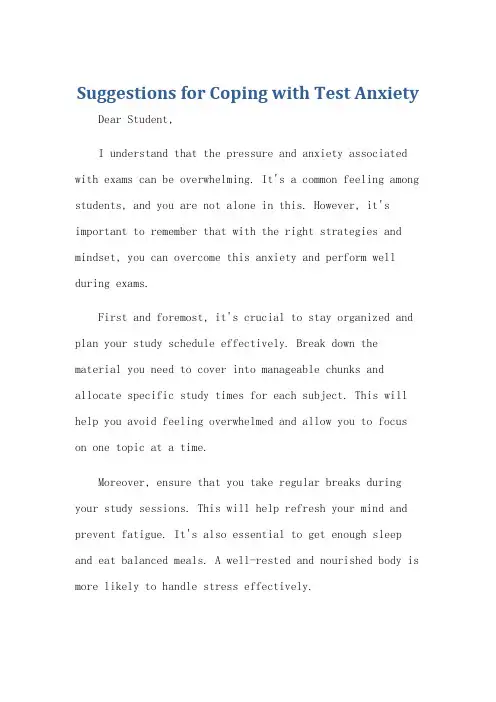
Suggestions for Coping with Test Anxiety Dear Student,I understand that the pressure and anxiety associated with exams can be overwhelming. It's a common feeling among students, and you are not alone in this. However, it's important to remember that with the right strategies and mindset, you can overcome this anxiety and perform well during exams.First and foremost, it's crucial to stay organized and plan your study schedule effectively. Break down the material you need to cover into manageable chunks and allocate specific study times for each subject. This will help you avoid feeling overwhelmed and allow you to focus on one topic at a time.Moreover, ensure that you take regular breaks during your study sessions. This will help refresh your mind and prevent fatigue. It's also essential to get enough sleep and eat balanced meals. A well-rested and nourished body is more likely to handle stress effectively.Another useful tip is to practice relaxation techniques. Deep breathing, meditation, or even simple exercises can help you calm your nerves and reduce anxiety. These techniques can be practiced regularly, even during short breaks, to help you stay calm and focused.Furthermore, it's important to remember that everyone has their own pace and abilities. Don't compare yourself to others or set unrealistic expectations. Focus on your own progress and celebrate your small achievements.Lastly, don't be afraid to seek help if you feel overwhelmed or unable to cope. Talk to your teachers, mentors, or even a trusted friend or family member. Theycan provide valuable advice and support during thisstressful time.Remember, exams are just a part of your academic journey, and they don't define your worth or abilities.Stay positive, stay focused, and trust in your preparation. You'll do just fine.Best wishes for your exams!Sincerely, [Your Name]**应对考试焦虑的建议**亲爱的同学:我理解考试带来的压力和焦虑感可能让你感到难以承受。
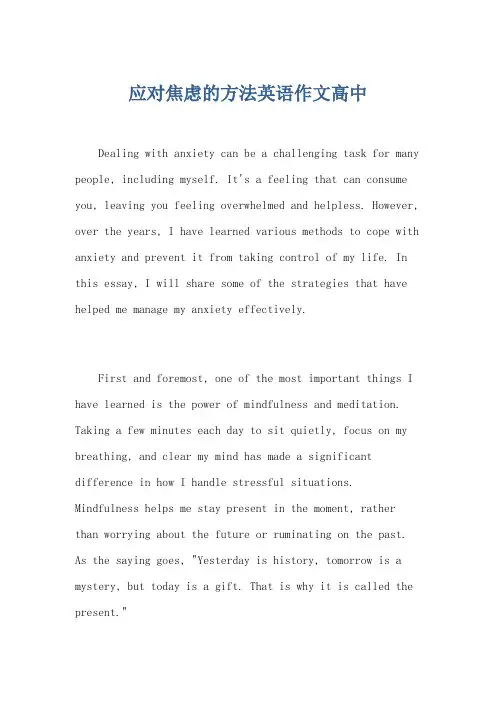
应对焦虑的方法英语作文高中Dealing with anxiety can be a challenging task for many people, including myself. It's a feeling that can consume you, leaving you feeling overwhelmed and helpless. However, over the years, I have learned various methods to cope with anxiety and prevent it from taking control of my life. In this essay, I will share some of the strategies that have helped me manage my anxiety effectively.First and foremost, one of the most important things I have learned is the power of mindfulness and meditation. Taking a few minutes each day to sit quietly, focus on my breathing, and clear my mind has made a significant difference in how I handle stressful situations. Mindfulness helps me stay present in the moment, rather than worrying about the future or ruminating on the past. As the saying goes, "Yesterday is history, tomorrow is a mystery, but today is a gift. That is why it is called the present."In addition to mindfulness, physical exercise has also been a crucial tool in my anxiety management toolbox. Exercise releases endorphins, which are natural moodlifters, and helps reduce levels of the body's stress hormones, such as adrenaline and cortisol. Whether it's going for a run, practicing yoga, or simply taking a brisk walk, getting moving can do wonders for alleviating anxiety. As the saying goes, "Exercise is the most underutilized antidepressant."Furthermore, talking to someone about my feelings has been incredibly beneficial in managing my anxiety. Whetherit's a friend, family member, therapist, or support group, expressing my worries and fears out loud can be a huge relief. It's true what they say, "A problem shared is a problem halved." Bottling up emotions and keepingeverything inside only serves to amplify anxiety, so it's important to reach out for support when needed.Another effective strategy I have found helpful is challenging negative thoughts and reframing them in a more positive light. Anxiety often feeds on irrational fears and catastrophic thinking, so it's important to question the validity of these thoughts. Asking myself, "Is this worry based on facts or just my imagination?" can help me gain perspective and reduce the intensity of my anxiety. As the saying goes, "Worrying is like a rocking chair. It gives you something to do but gets you nowhere."Moreover, engaging in activities that bring me joy and relaxation, such as reading, painting, or listening to music, has been a great way to distract myself from anxious thoughts. It's essential to carve out time for self-care and prioritize activities that nourish the soul. As the saying goes, "You can't pour from an empty cup. Take care of yourself first."Lastly, practicing gratitude and focusing on the positives in my life has been a powerful antidote to anxiety. Keeping a gratitude journal, where I write downthree things I'm thankful for each day, has shifted my mindset from one of lack to abundance. It's easy to get caught up in what's going wrong, but taking the time to appreciate what's going right can work wonders for mental well-being. As the saying goes, "Gratitude turns what we have into enough."In conclusion, anxiety is a common experience that many people face, but it doesn't have to control our lives. By incorporating mindfulness, exercise, seeking support, challenging negative thoughts, engaging in enjoyable activities, and practicing gratitude, we can effectively manage anxiety and lead a more fulfilling life. As the saying goes, "Life is 10% what happens to us and 90% how we react to it." So let's choose to react with resilience, strength, and positivity in the face of anxiety.。
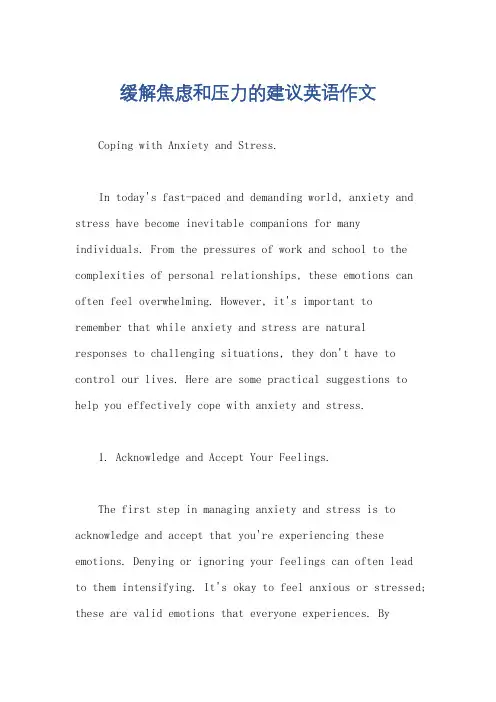
缓解焦虑和压力的建议英语作文Coping with Anxiety and Stress.In today's fast-paced and demanding world, anxiety and stress have become inevitable companions for many individuals. From the pressures of work and school to the complexities of personal relationships, these emotions can often feel overwhelming. However, it's important to remember that while anxiety and stress are natural responses to challenging situations, they don't have to control our lives. Here are some practical suggestions to help you effectively cope with anxiety and stress.1. Acknowledge and Accept Your Feelings.The first step in managing anxiety and stress is to acknowledge and accept that you're experiencing these emotions. Denying or ignoring your feelings can often leadto them intensifying. It's okay to feel anxious or stressed; these are valid emotions that everyone experiences. Byaccepting your feelings, you can begin to take control of your response to them.2. Identify the Source of Your Stress.Once you've acknowledged your feelings, it's crucial to identify the source of your stress. Is it a particular project at work? A conflict with a friend? Financial worries? By understanding the root cause of your stress, you can develop a targeted strategy to address it.3. Practice Mindfulness and Meditation.Mind.。
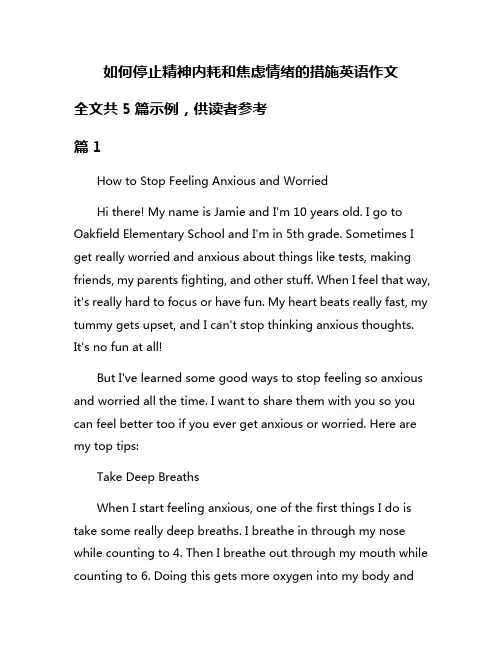
如何停止精神内耗和焦虑情绪的措施英语作文全文共5篇示例,供读者参考篇1How to Stop Feeling Anxious and WorriedHi there! My name is Jamie and I'm 10 years old. I go to Oakfield Elementary School and I'm in 5th grade. Sometimes I get really worried and anxious about things like tests, making friends, my parents fighting, and other stuff. When I feel that way, it's really hard to focus or have fun. My heart beats really fast, my tummy gets upset, and I can't stop thinking anxious thoughts.It's no fun at all!But I've learned some good ways to stop feeling so anxious and worried all the time. I want to share them with you so you can feel better too if you ever get anxious or worried. Here are my top tips:Take Deep BreathsWhen I start feeling anxious, one of the first things I do is take some really deep breaths. I breathe in through my nose while counting to 4. Then I breathe out through my mouth while counting to 6. Doing this gets more oxygen into my body andhelps me feel a lot calmer. My brain gets oxygen too which stops it from going into panic mode. Try it next time you feel worried - it really works!Talk to SomeoneKeeping my anxious thoughts locked up inside just makes me feel worse. That's why it's so important to talk to someone about what's bothering me. I can talk to my parents, my teacher, the school counselor, or a friend. Sometimes just saying the words out loud makes the anxious thoughts lose their power over me. The other person can also help me see things in a new way and give me a big hug if I need it.Make a Worry BoxI learned this one from my counselor at school. You take a small box or jar and decorate it with stickers, drawings, or whatever you want. Then when you're feeling worried, you write down your worry on a piece of paper and put it in the box. That way you're containing your worry instead of letting it take over your mind. Once a week, I go through the box with my mom and we talk about the worries I had that week. More often than not, I realize my worries weren't that big of a deal after all!Get MovingAnother great way to stop feeling anxious is to get my body moving! I love going for bike rides, playing basketball, jumping on my trampoline, or dancing around my room. Moving my body releases feel-good hormones called endorphins. They make me happier and less stressed out. Even just 15-20 minutes of exercise can make me forget why I was anxious in the first place.Think Positive ThoughtsThis one takes practice but it's so helpful. Whenever I catch myself thinking anxious, negative thoughts, I stop and replace them with positive thoughts instead. So if I'm thinking "I'm going to fail my math test," I change it to "I studied really hard and I'm going to do my best." Positive thoughts send happy signals to my brain and make my body relax. It's not always easy to think positively, but the more I practice the better I get at it.Those are my top tips for dealing with anxiety and worry! I hope they help you too. I haven't gotten rid of anxious feelings completely, and I don't think anyone really can. But using these strategies makes the anxious feelings a lot better and less frequent. I feel so much happier and more relaxed overall.Feeling worried sometimes is normal, but you don't have to let it take over your life. Just take some deep breaths, talk to someone, use a worry box, exercise, and think positively. I'm only10 years old but I've learned that I have the power to control my anxiety rather than letting it control me. You can do it too! Don't let worries get you down. See you later!篇2How to Stop Feeling Worried and Bad InsideDo you ever feel really worried or upset inside your mind and body? Maybe you get a nervous, fluttery feeling in your tummy. Or your heart beats really fast. Or you can't stop thinking scary thoughts. If so, you're not alone! Those feelings are called anxiety, and lots of kids and grownups experience them.Anxiety is no fun at all. It can make you feel crummy and ruin your day. The good news is there are things you can do to stop anxiety in its tracks! Here are some tips:Breathe DeepWhen you start feeling anxious, one of the first things to try is taking some reeeeeally deep breaths. That might sound too simple, but it works! Breathing deeply helps relax your body and clear your mind.Here's how to do it: Sit up nice and tall. Breathe in slowly through your nose while counting to 4 in your head. Let yourbelly puff out as you breathe in deeply. Then breathe out through your mouth to the count of 6, feeling your belly deflate. Keep breathing this way for a few minutes until you feel calmer.Get MovingAnother great way to stop anxiety is to get your body moving! Things like running, jumping, dancing, or playing a sport can help work off anxious energy in a positive way. Even just doing some silly shakes and wiggles can be helpful.Next time you notice yourself feeling anxious, ask a parent if you can go outside and run around for 10-15 minutes. See if you can run until you're feeling tired and relaxed rather than keyed up and worried.Positive Self-TalkThe voice inside your head can sometimes make anxiety worse by thinking anxious thoughts over and over, like "What if this bad thing happens?" or "I'll never be able to do this!" To stop this, you need to change your self-talk to be more positive.Tell yourself calming phrases like "This feeling will pass," "I can get through this," or "I am safe." Imagine a caring friend speaking those words to you. Positive self-talk can overpower anxious thoughts and help you feel better.Get CreativeFor some kids, doing a creative activity is a great way to get their mind off anxious thoughts. Things like drawing, painting, writing stories, building with Legos, or molding clay can be very soothing and distracting in a good way.The next time anxiety comes calling, grab your favorite art supplies or creative toys and pour your feelings into making something. As you get absorbed in being creative, those anxious thoughts will start to fade away.Talk It OutIf anxious thoughts and feelings are really bothering you, find a parent, teacher, or other trusted adult to talk to about what's on your mind. Sometimes just saying your worries out loud can make them feel less scary.A caring grownup can also help you get a new perspective on things so you don't get stuck in an anxious thought cycle. They may have good suggestions for coping with anxiety that you haven't thought of before.Be Patient and Keep TryingAnxiety can be really stubborn sometimes. You might try some of these coping strategies and still have a tough time feeling better right away. That's okay! Don't get discouraged.The key is to keep practicing these healthy habits whenever anxiety pops up. You're building important lifelong skills. Each time, it will get a little bit easier to show anxiety who's boss. With patience and perseverance, you've got this!So there you have it - some super tips for dealing with those anxious, worried feelings when they strike. Remember, anxiety happens to lots of kids and adults, and it's nothing to feel ashamed or afraid of. By taking care of your body and mind, you can kick anxiety to the curb!篇3Title: Feeling Worried? Here's How to Chill Out!Hey friends! Have you ever felt really stressed out or anxious about something? Maybe you had a big test coming up or you were worried about making the soccer team. I know I've felt that way before and it's no fun at all!Anxiety is like having a little monster in your brain that keeps telling you scary things. It makes you think too much about bad stuff that could happen. And mental burnout happens whenyou're too tired from worrying all the time. It's like your brain needs a break but it keeps going and going until you feel exhausted.Well, I've learned some awesome tips to kick that anxiety monster out and give your brain the chill pill it needs. Want to know what they are? Read on!Tip #1: Do Some Deep BreathingWhen you're anxious, your body goes into panic mode and you start breathing really fast and shallow. That's no good! It makes the anxiety worse. So the first thing to do is take some nice, slow, deep breaths.Breathe in through your nose while counting to 4. Let your belly puff out as you breathe in. Then breathe out through your mouth while counting to 6. Keep doing this until you feel calmer. It's like giving your brain some fresh air!Tip #2: Get Moving!When I'm feeling worried, I find it really helps to get my body moving instead of just sitting around. Exercise is great for anxiety because it gets those feel-good hormones called endorphins pumping. It also wears out your body so your brain doesn't have as much energy left to spin anxious thoughts.You could go for a bike ride, have a jump rope contest with your friends, shoot some hoops, or just put on some music and dance around like a silly goose! Whatever gets your heart beating faster for at least 20 minutes.Tip #3: Do Some MindfulnessMindfulness means focusing just on the present moment instead of worrying about the future or dwelling on the past. It's like giving your anxious brain a break.An easy mindfulness exercise is to look around you and try to notice every little sight, smell, texture, and sound in your environment. You could also focus on your breathing by watching your belly move in and out. Or you could squeeze a fuzzy stress ball and pay close attention to how it feels.Tip #4: Talk To SomeoneWhen I've got a lot of worries swirling around in my head, I always feel better after talking to someone I trust about what's bugging me. It could be a parent, teacher, older sibling, or friend. Sometimes just saying my anxious thoughts out loud helps get them out of my brain.Asking for a listening ear or a big hug can be so comforting when you're stressed. And the other person might have somegreat advice or a new perspective to help you stop those anxious thoughts from spinning.Tip #5: Get Artsy!If you're feeling anxious or mentally drained, it can be really relaxing and therapeutic to do some kind of art or craft activity. You could color in a coloring book, sculpt with play-doh, paint, draw, or make friendship bracelets. Anything that allows you to use your hands and be creative.Getting absorbed in an artistic project gives your brain a break from ruminating thoughts. And making something with your own two hands is so satisfying and can boost your confidence!Those are just a few tips I've learned for dealing with anxiety and mental burnout. Of course, if the worried, stressed out feelings stick around for a long time, it's a good idea to talk to a doctor or counselor about it. They have even more strategies to help.Just remember, anxiety happens to everyone sometimes. And feeling mentally drained from worrying too much is no fun. But you've got a whole toolkit of chill-out techniques to tryanytime you need to relax and hit the refresh button on your brilliant brain!篇4How to Stop Feeling Anxious and Worrying Too MuchHey friends! Today I want to talk about something that's really important – dealing with anxiety and worrying. I know a lot of kids my age struggle with feeling anxious or worrying too much about things. It's totally normal to feel that way sometimes, but it's not fun and can make you feel really yucky inside. The good news is there are things you can do to stop the anxious, worried feelings!First, it's important to understand what anxiety and worrying actually are. Anxiety is that feeling of being really nervous, tense, or scared about something. Your heart might start racing, your palms might get sweaty, and your tummy might feel all knotted up. Worrying is when you can't stop thinking about something bad that could happen, even if it's not very likely. You might worry about a test, a big game, or even little things like what to wear or say to your friends.So why do kids get anxious and worried? Well, there could be a lot of reasons. Maybe you're afraid of failing or making amistake. Maybe you're a perfectionist and put a lot of pressure on yourself. Maybe you've had a bad experience in the past that makes you scared it will happen again. Maybe you've just got a busy, active brain that likes to think about all the "what ifs". Whatever the reason, anxiety and worrying are no fun!But don't worry (haha), I've got some tips that can really help! One of the best things you can do is learn how to take deep breaths. It sounds so simple, but deep breathing is kind of like hitting the "relax" button for your body and mind. When you start feeling anxious, stop and take 5 big, slow breaths in through your nose and out through your mouth. You can even imagine blowing out the worries!Another really good trick is to talk back to your worried thoughts. Our brains can say some pretty silly things when we're anxious, like "I'm going to mess up my presentation and everyone will laugh at me!" When you have a thought like that, talk back to it with facts and positive statements. You could say "I've practiced a ton and I know what I'm talking about" or "Even if I make a mistake, it's not the end of the world."My next tip is to get those worries out of your head! You can write them down in a journal or just on a piece of paper. Getting worries out and onto paper can make them feel less jumbled andscary inside your mind. You can even rip up or recycle the paper when you're done – bye bye, worries!If you're feeling anxious about an upcoming event like a test or competition, my advice is to prepare as much as you can. Study really hard, practice your skills, and get a good night's sleep beforehand. When you've done everything to get ready, you can feel confident instead of anxious!Sometimes anxiety and worrying can make us avoid stuff because we're scared. But avoiding the thing you're anxious about just makes the anxiety bigger in the long run. It's better to face your fears little by little with the help of friends, family, or a counselor. That's how you can overcome anxiety!Another amazing tip is to get your body moving and grooving! Exercise is one of the best ways to get rid of anxious energy. You could go for a run, jump on a trampoline, dance around, or just do some silly shakes and wiggles. Physical movement is like a natural relaxer for the mind.Finally, don't forget to take breaks and make time for fun! Worrying too much can make you feel overwhelmed. Be sure to schedule breaks for activities you love like sports, art, music, or just playing outside. Laugh with your friends, read a silly book, orwatch a funny movie. Laughter and joy are the bestanxiety-busters!I really hope these tips can help you deal with anxiety and worrying in a healthy way. Just remember that it's okay to feel anxious sometimes – you're totally normal! But don't let anxiety take over and ruin your fun. Use these tricks to keep worries in check so you can live your best, happiest life. We've got this!篇5Title: Feeling Worried? Here's How to Feel Better!Have you ever felt really worried or stressed? Like your brain won't stop thinking about stuff and you can't focus on anything else? Maybe your tummy gets upset or you can't sleep at night because you're thinking too much. I've felt that way before and it's no fun at all! The good news is there are lots of things you can do to stop feeling so anxious and overwhelmed.The first thing is to take some deep breaths. It sounds simple but it really works! When you're feeling anxious, you start breathing faster and more shallow. This makes your body think there is an emergency and gets it all riled up. But if you breathe slowly and deeply, it sends a message that everything is okay. Your heart rate will slow down and you'll start to feel calmer.Here's how to do it: Sit up nice and tall, put one hand on your belly, and breathe in slowly through your nose. Feel your belly expand as the air fills your lungs. Then breathe out through your mouth, letting all the air go. Keep doing this for a few minutes, focusing just on your breathing. If your mind starts to wander, that's okay - just bring it back to the breathing. You'll be surprised how much better you feel!Another great way to stop worrying is to talk to someone you trust. It could be a parent, teacher, friend, grandparent, coach - anyone who will listen without judging you. Just getting whatever is bothering you off your chest can make a huge difference. You might also get a new perspective that helps put your mind at ease.When I'm really stressed, I like to write down my feelings in a journal. It's almost like having a conversation, except I'm the one doing all the talking! I'll write about whatever is on my mind and let all my thoughts and emotions spill out onto the page. Afterwards, I always feel lighter, like I've gotten rid of something heavy I was carrying around.If you're feeling anxious because you're worried about something coming up, it can help to prepare really well. Like if you have a big test, spend some time each day reviewing thematerial instead of cramming at the last minute. Or if you have to give a presentation, practice it out loud until you know it backwards and forwards. The more ready you feel, the less you'll stress about it.Exercise is another awesome way to get rid of anxious energy. When you work up a sweat, your body releases chemicals called endorphins that make you feel good. It's like a natural anti-anxiety medicine! You could go for a bike ride, play at the park, shoot some hoops, or just dance around your room. Whatever gets your body moving.Sometimes anxiety can come from negative self-talk. You know, when you call yourself names or tell yourself you're no good at something. That's just going to make you feel worse! Instead, practice being kind and patient with yourself. If you missed a bunch of questions on a test, don't beat yourself up over it. Just make a plan to study harder next time. And remind yourself that you're awesome in lots of other ways!It's also really important to take breaks, even from stuff you enjoy. If you're feeling burned out from hours of video games or basketball practice, give your brain a rest. Read a book, work on a puzzle, or just veg out for a little while. You'll come back to your activity feeling recharged.And finally, don't forget the basics: Getting enough sleep, eating healthy foods, and staying hydrated. It's so much harder to handle your emotions when you're running on fumes! Aim for at least 8-10 hours of sleep a night, drink plenty of water, and fill up on good stuff like fruits, veggies, whole grains and lean protein.Anxiety and worrying are no fun, but they don't have to stick around forever. Just take it one day at a time, and try out some of these tips anytime you need to hit the refresh button on your mind. You've got this!。
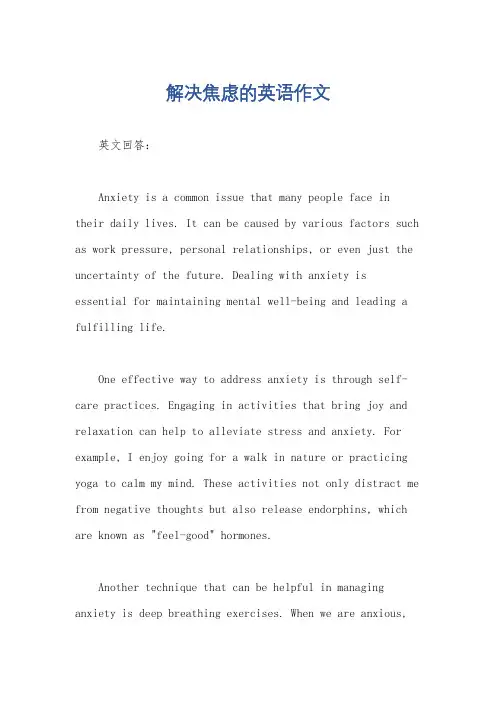
解决焦虑的英语作文 英文回答: Anxiety is a common issue that many people face in their daily lives. It can be caused by various factors such as work pressure, personal relationships, or even just the uncertainty of the future. Dealing with anxiety is essential for maintaining mental well-being and leading a fulfilling life.
One effective way to address anxiety is through self-care practices. Engaging in activities that bring joy and relaxation can help to alleviate stress and anxiety. For example, I enjoy going for a walk in nature or practicing yoga to calm my mind. These activities not only distract me from negative thoughts but also release endorphins, which are known as "feel-good" hormones.
Another technique that can be helpful in managing anxiety is deep breathing exercises. When we are anxious, our breathing tends to become shallow and rapid. Taking slow, deep breaths can activate the body's relaxation response and promote a sense of calmness. Personally, I find the 4-7-8 breathing technique effective. It involves inhaling for a count of 4, holding the breath for 7 counts, and exhaling for 8 counts.
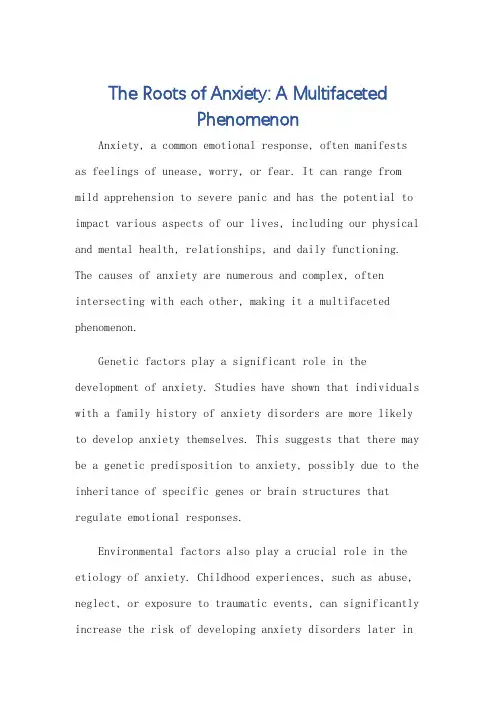
The Roots of Anxiety: A MultifacetedPhenomenonAnxiety, a common emotional response, often manifests as feelings of unease, worry, or fear. It can range from mild apprehension to severe panic and has the potential to impact various aspects of our lives, including our physical and mental health, relationships, and daily functioning. The causes of anxiety are numerous and complex, often intersecting with each other, making it a multifaceted phenomenon.Genetic factors play a significant role in the development of anxiety. Studies have shown that individuals with a family history of anxiety disorders are more likely to develop anxiety themselves. This suggests that there may be a genetic predisposition to anxiety, possibly due to the inheritance of specific genes or brain structures that regulate emotional responses.Environmental factors also play a crucial role in the etiology of anxiety. Childhood experiences, such as abuse, neglect, or exposure to traumatic events, can significantly increase the risk of developing anxiety disorders later inlife. Similarly, life events such as the loss of a loved one, divorce, or job loss can trigger anxiety symptoms.Biological factors also contribute to the development of anxiety. For example, certain brain chemicals, such as serotonin and dopamine, are involved in regulating mood and anxiety levels. Abnormalities in the functioning of these neurochemicals can lead to anxiety symptoms. Additionally, physical health conditions, such as thyroid disorders or heart disease, can also manifest as anxiety.Psychological factors are also key players in anxiety. Negative self-talk, perfectionism, and a tendency to ruminate on negative thoughts can all contribute tofeelings of anxiety. Furthermore, a lack of coping skills or a sense of control can leave individuals feeling helpless and anxious in the face of stressful situations. Social factors also play a role in anxiety. Social pressures, expectations, and a fear of judgment can lead to feelings of inadequacy and anxiety. Social isolation, a lack of social support, and a sense of not belonging can exacerbate these feelings.In conclusion, the causes of anxiety are diverse and interconnected, involving genetic, environmental, biological, psychological, and social factors. Understanding these factors is crucial in addressing anxiety effectively, as it allows us to target the underlying causes and develop comprehensive treatment plans that address the individual's unique needs.**焦虑的根源:一个多面的现象**焦虑是一种常见的情绪反应,通常表现为不安、担忧或恐惧。
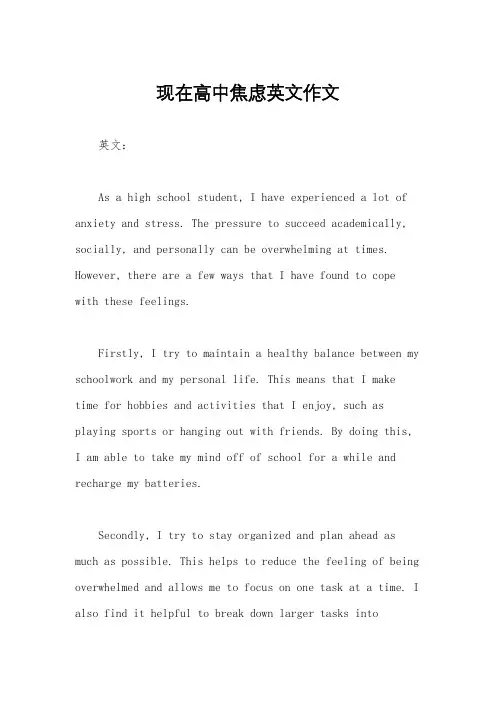
现在高中焦虑英文作文英文:As a high school student, I have experienced a lot of anxiety and stress. The pressure to succeed academically, socially, and personally can be overwhelming at times. However, there are a few ways that I have found to cope with these feelings.Firstly, I try to maintain a healthy balance between my schoolwork and my personal life. This means that I make time for hobbies and activities that I enjoy, such as playing sports or hanging out with friends. By doing this, I am able to take my mind off of school for a while and recharge my batteries.Secondly, I try to stay organized and plan ahead as much as possible. This helps to reduce the feeling of being overwhelmed and allows me to focus on one task at a time. I also find it helpful to break down larger tasks intosmaller, more manageable ones.Finally, I try to remind myself that it is okay to make mistakes and that failure is a natural part of the learning process. By reframing my mindset in this way, I am able to take more risks and try new things without the fear offailure holding me back.中文:作为一名高中生,我经历了很多焦虑和压力。
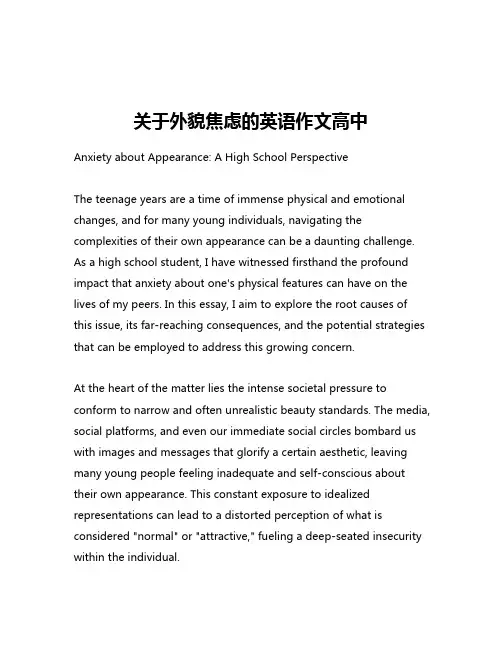
关于外貌焦虑的英语作文高中Anxiety about Appearance: A High School PerspectiveThe teenage years are a time of immense physical and emotional changes, and for many young individuals, navigating the complexities of their own appearance can be a daunting challenge. As a high school student, I have witnessed firsthand the profound impact that anxiety about one's physical features can have on the lives of my peers. In this essay, I aim to explore the root causes of this issue, its far-reaching consequences, and the potential strategies that can be employed to address this growing concern.At the heart of the matter lies the intense societal pressure to conform to narrow and often unrealistic beauty standards. The media, social platforms, and even our immediate social circles bombard us with images and messages that glorify a certain aesthetic, leaving many young people feeling inadequate and self-conscious about their own appearance. This constant exposure to idealized representations can lead to a distorted perception of what is considered "normal" or "attractive," fueling a deep-seated insecurity within the individual.Moreover, the rise of social media has exacerbated the problem, as young people are increasingly exposed to the carefully curated and filtered images of their peers. The constant comparison to these seemingly flawless depictions can trigger feelings of inadequacy and a relentless pursuit of physical perfection. This can result in a vicious cycle of low self-esteem, anxiety, and a preoccupation with one's appearance that can have detrimental effects on an individual's overall well-being.The consequences of this anxiety about appearance can be far-reaching and profound. Many high school students find themselves struggling with issues such as poor body image, disordered eating habits, and even depression. The constant focus on physical appearance can lead to a neglect of other important aspects of personal development, such as academic performance, social relationships, and the pursuit of meaningful hobbies and interests.Furthermore, the impact of appearance-related anxiety can extend beyond the individual, affecting interpersonal relationships and social dynamics within the high school community. Individuals who are perceived as "attractive" or "unattractive" may face social exclusion, bullying, or even discrimination, further exacerbating the emotional turmoil experienced by those struggling with body image concerns.In addressing this pressing issue, it is crucial to adopt a multifaceted approach that encompasses both individual and societal interventions. At the individual level, fostering a positive and resilient self-image is paramount. This can be achieved through the cultivation of self-acceptance, self-compassion, and a focus on the inherent worth and uniqueness of each individual, regardless of their physical attributes.Additionally, providing access to mental health resources and support services within the high school setting can be invaluable in helping students navigate the emotional challenges associated with appearance-related anxiety. Counseling, peer support groups, and educational programs that promote body positivity and healthy coping strategies can empower young people to develop a more balanced and holistic perspective on their appearance and self-worth.At the societal level, there is a pressing need to challenge the narrow and unrealistic beauty standards that permeate our culture. This can be achieved through the promotion of diverse and inclusive representations in the media, the education of young people on the impact of such standards, and the active dismantling of harmful stereotypes and prejudices.Furthermore, the involvement of parents, teachers, and community leaders in fostering a supportive and accepting environment foryoung people can play a crucial role in addressing this issue. By creating spaces where individuals feel safe to express their authentic selves and celebrate their unique qualities, we can help to alleviate the burden of appearance-related anxiety and empower the next generation to embrace their inherent worth and beauty.In conclusion, the issue of anxiety about appearance among high school students is a complex and multifaceted challenge that requires a comprehensive and collaborative approach. By addressing the root causes, providing targeted support, and promoting a more inclusive and accepting societal landscape, we can empower young people to develop a healthy and positive relationship with their physical appearance, ultimately leading to greater overall well-being and personal fulfillment.。

每个人都会有苦恼焦虑的时候英语作文Everyone experiences moments of distress and anxiety at some point in their lives.These feelings can be overwhelming, making it difficult to concentrate or even function properly.However, it"s important to remember that such emotions are a normal part of being human.每个人在生命中的某个阶段都会遇到苦恼和焦虑的时刻。
这些情绪可能会让人感到无法承受,影响到我们的专注力和正常生活。
然而,我们必须牢记,这些情感是人类经历中不可或缺的一部分。
Life"s challenges can trigger worries and fears, causing restlessness and uncertainty.The pressure to succeed academically, professionally, or personally can lead to stress and anxiety.However, it"s during these trying times that we must learn to cope and grow stronger.生活中的挑战可能引发担忧和恐惧,造成心神不宁和不确定性。
在学业、职业或个人生活上追求成功的压力可能导致压力和焦虑。
然而,正是在这些艰难时期,我们必须学会应对并变得更加坚强。
In order to overcome these negative emotions, it"s crucial to develop healthy coping mechanisms such as exercise, meditation, or seeking support from friends and family.Remember, asking for help is not a sign of weakness, but rather a step towards healing and self-improvement.为了克服这些负面情绪,培养健康的应对机制至关重要,如锻炼、冥想或向亲朋好友寻求支持。
有关焦虑方面的英语作文标题,Understanding and Coping with Anxiety。
In today's fast-paced world, anxiety has become a common mental health issue affecting people of all ages. From the pressures of academic performance to the demands of the workplace, individuals often find themselves overwhelmed by feelings of worry and unease. In this essay, we will explore the nature of anxiety, its causes, and effective coping strategies.Anxiety is a natural response to stress or perceived threats. It is characterized by feelings of tension, nervousness, and apprehension about future events. While occasional anxiety is normal, persistent and excessive worrying can interfere with daily life and lead to serious consequences for mental and physical well-being.There are various factors that contribute to the development of anxiety disorders. Genetics plays asignificant role, as individuals with a family history of anxiety are more likely to experience it themselves. Additionally, environmental factors such as traumatic experiences, chronic stress, and substance abuse can increase the risk of developing anxiety disorders. Furthermore, certain personality traits, such as perfectionism and low self-esteem, can predispose individuals to anxiety.One of the most common anxiety disorders is generalized anxiety disorder (GAD), which is characterized bypersistent and excessive worrying about various aspects of life, such as work, health, and relationships. Other types of anxiety disorders include panic disorder, social anxiety disorder, and specific phobias.Living with anxiety can be challenging, but there are several strategies that can help individuals manage their symptoms and improve their quality of life. Cognitive-behavioral therapy (CBT) is a highly effective treatmentfor anxiety disorders, as it helps individuals identify and challenge negative thought patterns and develop healthiercoping mechanisms. Medication, such as antidepressants and anti-anxiety drugs, may also be prescribed in severe cases of anxiety.In addition to professional treatment, there are several self-help techniques that can help individuals cope with anxiety on a day-to-day basis. Mindfulness meditation, deep breathing exercises, and progressive muscle relaxation are effective ways to reduce stress and promote relaxation. Regular exercise, adequate sleep, and a healthy diet can also play a significant role in managing anxiety symptoms.Furthermore, building a strong support network of friends, family, and mental health professionals can provide individuals with the encouragement and assistance they need to overcome anxiety. Talking openly about one's feelings and experiences can help reduce feelings of isolation and shame associated with anxiety disorders.In conclusion, anxiety is a common mental health issue that affects millions of people worldwide. While it can be debilitating at times, there are effective treatments andcoping strategies available to help individuals manage their symptoms and live fulfilling lives. By seeking professional help, practicing self-care techniques, and building a support network, individuals can overcome anxiety and reclaim control over their mental health. Remember, you are not alone, and help is available.。
焦虑的英语作文高中作文Anxiety is a common feeling that many people experience at some point in their lives. It is a feeling of unease, such as worry or fear, that can be mild or severe. While it is natural to feel anxious at times, excessive anxiety can be detrimental to one's mental health and overall well-being.There are many causes of anxiety, including stress, trauma, genetics, and certain medical conditions. Stress is a major contributor to anxiety, as it can cause the body to release cortisol, a hormone that triggers the "fight or flight" response. Trauma can also lead to anxiety, as it can cause a person to feel unsafe and vulnerable. Genetics can play a role in anxiety, as some people may be more prone to anxiety disorders due to their family history. Certain medical conditions, such as heart disease orthyroid disorders, can also cause anxiety.Symptoms of anxiety can vary from person to person, butcommon symptoms include restlessness, irritability, difficulty sleeping, and panic attacks. In severe cases, anxiety can lead to depression, substance abuse, and suicidal thoughts.Fortunately, there are many ways to manage anxiety. One effective method is through therapy, such as cognitive behavioral therapy (CBT), which helps individuals identify and change negative thought patterns. Medications, such as antidepressants and anti-anxiety drugs, can also be helpful in managing anxiety. Lifestyle changes, such as exercise, healthy eating, and stress reduction techniques like meditation and yoga, can also be beneficial.It is important to seek help if you are experiencing excessive anxiety, as it can have a significant impact on your daily life. With the right treatment and support, itis possible to manage anxiety and improve your overallwell-being.In conclusion, anxiety is a common feeling that can be caused by a variety of factors. While it is natural to feelanxious at times, excessive anxiety can be detrimental to one's mental health and well-being. Fortunately, there are many ways to manage anxiety, including therapy, medication, and lifestyle changes. If you are experiencing excessive anxiety, it is important to seek help and support.。
怎样解决焦虑情绪英语作文
英文回答:
When I feel anxious, I usually try to find ways to calm myself down. One thing that helps me is taking deep breaths and focusing on my breathing. I also find it helpful to
talk to someone I trust about what's making me anxious. Sometimes just getting my feelings out in the open can make me feel better. Another thing that helps me is doing something I enjoy, like going for a walk or listening to music. Taking a break from whatever is causing me anxiety can give me a fresh perspective and help me feel more relaxed.
中文回答:
当我感到焦虑的时候,我通常会尝试找到方法来让自己平静下来。
一件帮助我的事情是深呼吸并专注于我的呼吸。
我也发现和我信任的人谈谈让我感到焦虑的原因对我有帮助。
有时候把我的感受说出来就能让我感觉好一些。
另一件帮助我的事情是做一些我喜欢
的事情,比如散步或者听音乐。
暂时远离导致我焦虑的事情可以让我有一个新的视角,并帮助我感到更放松。
Suggestions for Relieving Anxiety and Stress In the fast-paced and highly stressful world we live in today, anxiety and stress have become increasingly common issues that affect individuals across all age groups and backgrounds. These emotions can have a significant impact on our mental health, leading to decreased productivity, sleep disturbances, and even physical ailments. Therefore, it is crucial to find effective ways to manage andalleviate these negative emotions. Here are some practical suggestions for relieving anxiety and stress.Firstly, exercise regularly. Physical activities such as running, swimming, or even simple walking can help to reduce stress levels and promote relaxation. Exercise releases endorphins, the "happy hormones" in our bodies, which help to improve our mood and reduce feelings of anxiety. Additionally, regular exercise can also improve sleep quality, another key factor in managing stress.Secondly, practice mindfulness and meditation. By focusing on the present moment and tuning out external distractions, we can gain a sense of tranquility and peace. Meditation techniques, such as deep breathing or guidedvisualizations, can help us to achieve this state of mindfulness. Regular practice can train our minds to bemore resilient against stress and anxiety.Thirdly, connect with others. Talking to friends or family members about our feelings and experiences can often help to alleviate stress and anxiety. Sharing our thoughts and feelings can provide a sense of validation and support, which can be extremely beneficial in reducing stress levels. Additionally, joining support groups or communities that share similar interests can also provide a sense of belonging and reduce feelings of isolation.Fourthly, manage our time effectively. A hecticschedule and overwhelming workload can often lead tofeelings of stress and anxiety. By prioritizing tasks, setting realistic goals, and taking regular breaks, we can better manage our time and reduce stress levels. It is also important to remember to incorporate fun and relaxationinto our daily routines, as this can help to balance outthe demands of our work and personal lives.Lastly, seek professional help if necessary. If stress and anxiety become overwhelming and interfere with ourdaily lives, it may be necessary to seek professional support. Therapists and counselors can provide valuable guidance and support in managing stress and anxiety, and help us to develop coping strategies that are tailored to our individual needs.In conclusion, relieving anxiety and stress is an important aspect of maintaining our mental health and well-being. By incorporating regular exercise, practicing mindfulness and meditation, connecting with others, managing our time effectively, and seeking professional help if needed, we can better manage and alleviate these negative emotions. Remember, it is okay to feel stressed or anxious sometimes, but it is also important to take action to address these feelings and maintain our overall well-being.**缓解焦虑和压力的建议**在当今快节奏、高压力的社会中,焦虑和压力已成为影响各年龄段和各背景人群的普遍问题。
第 1 页 共 4 页
有关焦虑的高中英语作文
你有过焦虑吗?下面,小编帮你整理了有关焦虑的高中英语作文,
希望你喜欢!
有关焦虑的高中英语作文篇1
Many of us feel somehow nervous whenever we are taking
an important exam. Nervousness not only does harm to
students health but also disturbs our studies. So its necessary
for us students to learn to relax. I think its very important to
have a right attitude towards exams. Exams are only a means
of checking what we have learned. Therefore there is no need
to worry too much about the results of the exams. Before an
exam making a scientific study plan and keeping a peaceful
mind can help to reduce the pressure from the exam. We can
also relax ourselves by doing sports and listening to music.
Besides enough sleep and a balanced diet will work as well.
Follow my advice and you will enjoy your school life.
当我们参加一个重要的考试时,我们中的许多人感到有点紧张。
紧张不仅对学生的健康有害,而且扰乱了我们的学习。因此,我们有
必要让学生学会放松。我认为有一个正确的考试态度是非常重要的。
考试只是检查我们学到的东西的一种手段。因此,没有必要担心考试
的结果太多。在考试之前,制定一个科学的学习计划和保持一个平静
第 2 页 共 4 页
的头脑可以帮助减轻考试的压力。我们也可以通过做运动和听音乐来
放松自己。此外,充足的睡眠和均衡的饮食也会起到很好的工作。
听从我的建议,你会享受你的学校生活。
有关焦虑的高中英语作文篇2
Dear Linda
I kown your problem through your letter.I hope my advice
will be of some value to you.
First of allyou need try your best to learn english by
communicating with others.It can heip improve your spoken
english.Secondlyyou should be helpful to others so as you can
leave a good empression on your friends.The last but not the
leasttaking an active part in after school activities plays an
important role in your friendshipswhich wii make you kown
more friends.
Difficulties may always lay in our livesplease dont be
down.We are always there if you need.Wish you can adapt to
your new life earlier.
Yours 亲爱的琳达
我知道你的问题在你的信。我希望我的建议能对你有价值。
首先,你需要尽量与别人交流学习英语。它可以帮助提高你的英
语口语。其次,你要帮助别人,你可以对你的朋友们留下一个好印象。
最后但并非最不重要的,以积极参加课外活动在你的友谊中一个重要
第 3 页 共 4 页
的角色,它让你认识更多朋友的Wii。
困难可能永远躺在我们的生活中,请不要失望,如果你需要,我
们总是在那里,希望你能适应你的新生活。
你的
有关焦虑的高中英语作文篇3
Effects of students writing enhancement factor is many
sidedpsychological factors such as anxiety is one of
important aspect.A lot of English writing of weak students in
teacher and exchange is showing afraid of writingtired of
writing emotionssome students said: see the English
composition. Some students said: I will write sentences
somehow in the writing of a hurry on to write out. The author
thinks that these students on English writing.This anxiety
will hinder them to improve English writing ability.Psychology
thinks:anxiety is the biggest obstacle in language learning.It
can generate tensionfear and upsetdirectly led to the behavior
of the failureand then increase the psychological tension and
fear.If the student often of English writing a anxiety so they
can escape from the heart of English writing and all associated
with the writing activitymanifested in the action will be on the
English writing of passive coping and even refused to writing
training.As a junior high school English teachers how to help
第 4 页 共 4 页
students overcome anxiety in English writing?I thinkfirst of
allthe teacher should pay attention to in writing teaching to
stimulate students interest in the topic of
writing.Secondlyteachers can adopt various forms to change
students writing training for English writing
stereotypes .Finallyencourage students to extend the
extracurricular English readingthrough a variety of ways to
understand English correct expression.